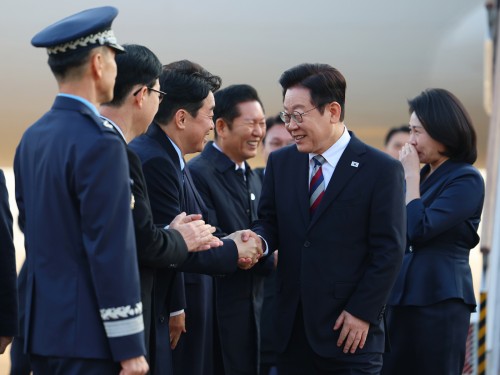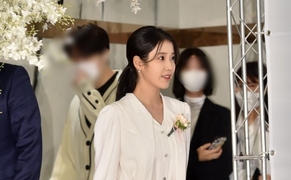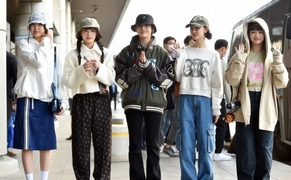 |
| President Lee Jae-myung shakes hands with Chief of Staff Kang Hoon-sik upon arriving at Seoul Air Base in Seongnam on Nov. 26 after completing his visits to four Middle Eastern and African nations. / Yonhap News |
President Lee Jae-myung returned to Seoul on the morning of Nov. 26 after a 10-day trip through the Middle East and Africa, marking the end of his fifth overseas tour since taking office.
Over roughly six months, Lee has visited eight countries, attended five multilateral summits and held bilateral meetings with leaders from 29 nations. Through talks with major powers including the United States, China, Japan, the United Kingdom, France and Germany, he worked to reinforce diplomatic ties, while also widening cooperation with the Global South — spanning the Middle East, Africa and emerging economies. When follow-up meetings and informal encounters are counted, Lee has met foreign leaders on more than 40 occasions, pursuing what he calls “practical, national-interest diplomacy.”
His rapid diplomatic pace is seen as more than just a resumption of summit diplomacy that had stalled after the Dec. 3 martial law crisis. Observers say he has made early progress establishing a foundation for broad-based “sales diplomacy” in fields such as artificial intelligence, defense exports and nuclear energy.
Since his inauguration, Lee has travelled a combined 142,000 kilometers — the equivalent of about three and a half trips around the globe. His total flight time stands at 158 hours.
Just 12 days into his presidency, Lee flew to Calgary to attend the G7 Summit. In August, he traveled to Washington, D.C., for his first summit with U.S. President Donald Trump. He followed that with a visit to the U.N. General Assembly in September, the ASEAN Summit in Malaysia in October, and the G20 Summit in South Africa in November. In late October, he hosted the APEC Summit in Gyeongju as chair.
Within six months, Lee managed a schedule that would be considered intense even for a seasoned leader: U.S.–Korea summits, Korea–Japan and Korea–China summits, and chairing APEC as host. His administration also scored tangible outcomes, including steering U.S.–Korea tariff negotiations in Seoul’s favor and successfully concluding the APEC meetings.
Lee now appears increasingly confident on the diplomatic stage. Aboard the presidential plane en route to Türkiye on Nov. 24, he emphasized that strengthening economic cooperation with China and deepening the U.S.–Korea alliance are “not mutually exclusive,” adding that Korea can expand diplomatic space by balancing and mediating between the two.
He also said conversations with the leaders of India and Brazil at the G20 convinced him to plan visits to both countries soon, noting that “even brief discussions revealed many areas for cooperation and synergy.”
Lee added that Korea’s foreign policy “remains highly fragmented” and said the government must reorganize its diplomatic strategy in a more systematic and comprehensive way, with more detailed management of cooperation with partner countries.
Most Read
-
1
-
2
-
3
-
4
-
5
-
6
-
7





















